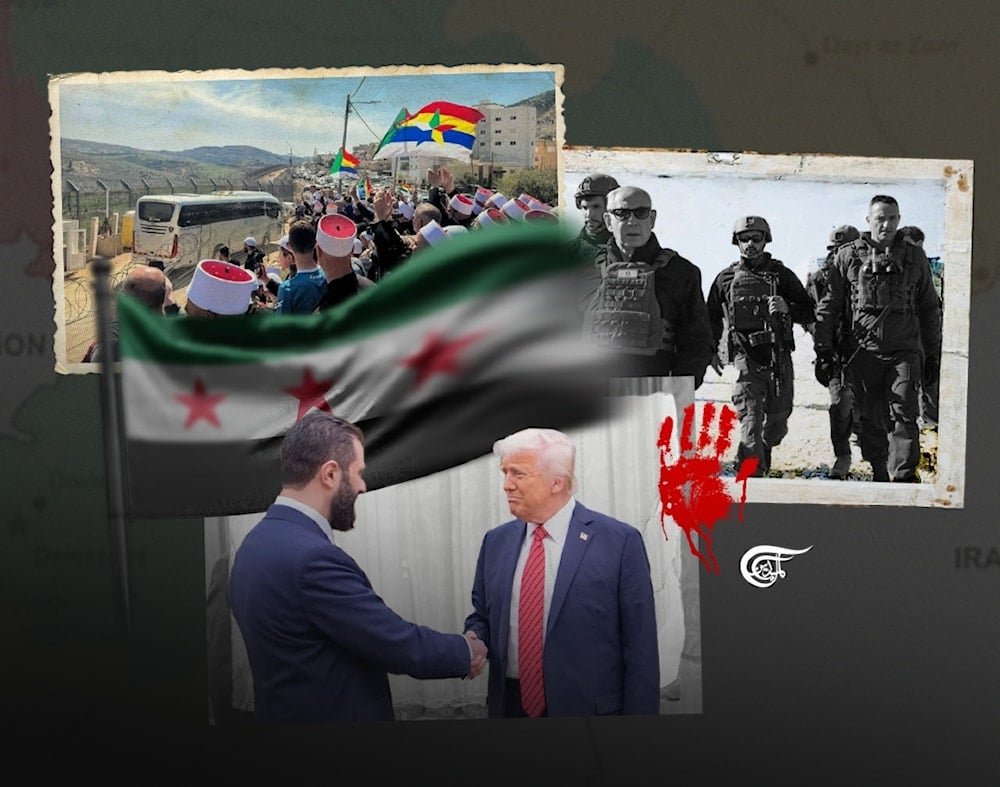The Israeli Syria Dilemma
Robert Inlakesh discusses how Syria’s new leadership under Ahmad al-Sharaa is courting normalization with "Israel" from a position of weakness, enabling Zionist expansion into southern Syria while abandoning Palestinian and national resistance.
-

It is clear that the Israeli project in Syria is not over and that Tel Aviv seeks to use what it sees as a historic opportunity to divide the country and achieve “Greater Israel”. (Al Mayadeen English; Illustrated by Zeinab El-Hajj)
Although it could appear that the Israelis are having their way with Syria, their aggression is short sighted and could at any moment backfire. The only reason they still enjoy the freedom to continue carrying on in the manner they are, is because of the leadership in Damascus.
Syria’s new President Ahmad al-Sharaa and his administration, staffed primarily by members of Hay'at Tahrir al-Sham (HTS), have so far failed to take advantage of opportunity after opportunity that have fallen in their laps. Instead of uniting the country behind a common cause, working on building a strong functional nation, and finding some leverage to use in future negotiations, they chose the path of least resistance.
We have now reached a phase in Syria where President al-Sharaa, according to several sources who spoke to both Reuters and The Times, is considering a normalisation deal with the Zionist entity. To begin with, even the fact that this is being spoken of and he hasn’t denied it is an admission of guilt and represents a betrayal of the Palestinian people.
Yet, putting aside the fact that normalisation with the Zionist entity would make al-Sharaa and his administration directly complicit in the genocide of Palestinians in Gaza and a collaborator with the Israeli regime, it is a ridiculous move, politically speaking.
What we have to understand here is that the Israelis are not the ones begging Syria for a normalisation agreement, it is the other way around. However, the Syrian government has no leverage whatsoever. As al-Sharaa remains trapped between multiple regional and Western interests, he evidently has little wiggle room with which he can work in order to make his regime work.
For example, one of his primary backers is Turkiye, which has at least publicly expressed its interest in strengthening the Syrian State and also uniting it, whereas the Israelis put their foot down and are openly seeking balkanisation of the country. This all came to a head when the Syrian security forces were ordered to seize Druze majority areas south of Damascus and to head towards Sweida.
Unfortunately, al-Sharaa decided to completely dismantle the Syrian Arab Army (SAA) and pull apart the security forces, meaning that the de facto military and security forces of the country are a collection of largely ill-trained and undisciplined militiamen. So, when they are sent into any area, we see sectarian bloodshed and lawlessness. This is then exploited by the Israelis, who back their own militia forces, falsely claiming to be on the side of Syria’s Druze community.
To give some context to this situation, the Israelis were giving military, financial, and medical aid to Jabhat al-Nusra - now rebranded as HTS - at a time when it was committing massacres against Druze civilians, yet are now pretending to be the saviours of those same communities.
Because of the fact that al-Sharaa doesn’t have a real army or security forces yet, militarily, he is weak. Then, when he attempts to disarm Syrian villages, this only ends up dividing the country further. Meanwhile, the US, EU, UK, UAE, Saudi Arabia, Turkiye and other players all have their own opinions on what Damascus should be doing.
What al-Sharaa has chosen to do is suck up to the United States and the rest of the collective West, yet he lacks the intellectual prowess necessary to negotiate with them properly. Instead, he is floating ridiculous proposals like the construction of a Trump Tower in Damascus and a Ukraine-style resource deal with the US. He also believes that making friends with the West is as easy as joining a normalisation deal with the Zionist regime.
Yet, when the Israelis look at Syria, they see a leadership that is willing to crack down on the Palestinian Resistance, allow the occupation of their lands and abandons its own people who are coming under attack. Therefore, Israeli PM Benjamin Netanyahu looks at the predicament of Syria and laughs at the prospect of normalisation for now, not because he doesn’t eventually seek this outcome, but because there is no need to entertain it yet.
Instead, the Israelis are looking to exploit the weakness of the Syrian leadership and push for finishing their agenda in at least the south of the country. The Zionists have long sought to annex a large portion of strategic territory in southern Syria, which they are doing without so much as a single bullet fired at them from the forces belonging to Damascus, while working alongside Syrian minority militias to extend their de facto control all the way to the Euphrates River.
The major challenge now, for the Zionist entity, has nothing to do with the government in Damascus, but rather how far it can get away with pushing. We have already seen signs from local forces in Daraa, that there are groups willing to defend their villages and cities. This local resistance, rather than the government, is the primary factor holding the Zionist advance back.
If you trace back to the reaction to the ambushes carried out against the convoys of Israeli soldiers in southern Syria, the immediate response was to withdraw and use airpower to inflict deaths and injuries in Daraa. It has now been over a month since the clashes occurred, and the Israelis have not admitted to their casualties, nor have they bothered returning on the ground.
The Israeli agenda does not actually encompass any areas that extend beyond Damascus, they have been very open with their intentions being contained to everywhere south of the Syrian Capital. Yet, they have painted themselves into a corner that could result in a brief incursion into Damascus at some point or another.
The Israeli Premier, Benjamin Netanyahu, has pledged to come to the aid of the Druze communities in Syria, which has ended up causing tensions within the Israeli Druze population in occupied Palestine. The Israeli Druze serve crucial roles in the Israeli military and contribute greatly to the Zionist regime’s economy, therefore, when Netanyahu pledges to help the Druze of Syria, this is not a pledge he can simply go back on.
When Ahmed al-Sharaa sent his security forces towards Sweida, this caused protests amongst Israeli Druze and calls for a ground incursion to fight against the Syrian government forces. That night, Israeli airstrikes were launched within 500 meters of the Presidential palace as a warning to the Syrian president. This was followed by one of the largest bombing campaigns in past decades against the country.
In response, al-Sharaa capitulated and decided to arrest the Secretary General of the Popular Front for the Liberation of Palestine General Command (PFLP-GC), Talal Naji, likely in a good will gesture to help the Zionist regime locate the body of an Israeli soldier considered missing since 1982.
It is clear that the Israeli project in Syria is not over and that Tel Aviv seeks to use what it sees as a historic opportunity to divide the country and achieve “Greater Israel”. But this will come at a potentially huge cost, due to the fact that more action inside southern Syria will eventually lead to an organic resistance movement emerging. On the other hand, if the Zionists decide to engage with Syrian security forces on the ground, there is no telling how things could spiral out of control.
The Israelis simply do not have the ground capability to open up another broad front inside of Syria, because if they do so, they are going to leave themselves vulnerable on other fronts. If the current Syrian administration was politically intelligent, it would weaponise the situation to its benefit. Instead, it appears to be appealing for normalization without any need for Israeli concessions, meanwhile, Netanyahu doesn’t appear to be entertaining a deal at this time and wants to steal more from Syria first.

 Robert Inlakesh
Robert Inlakesh
 8 Min Read
8 Min Read











